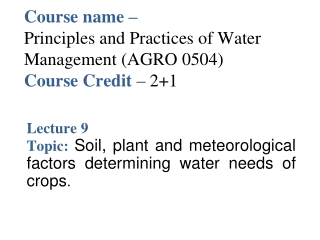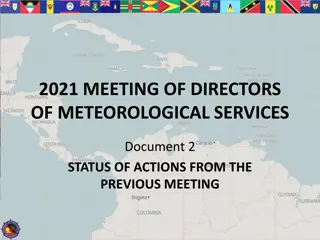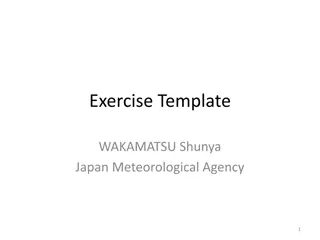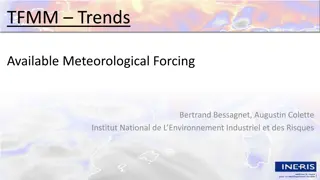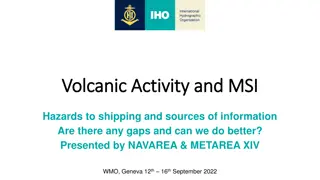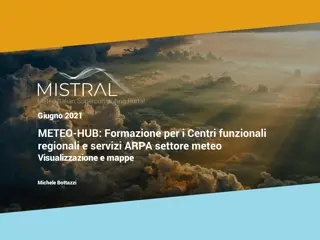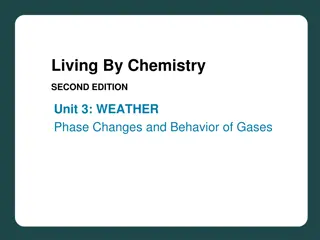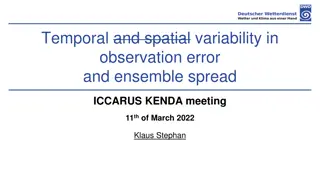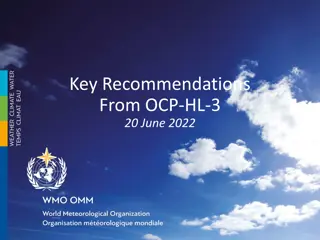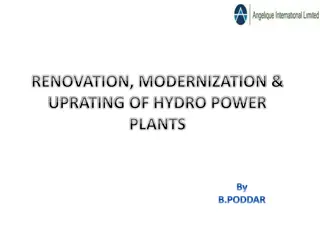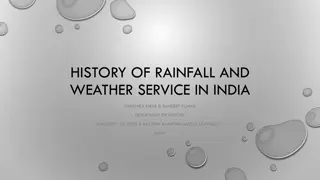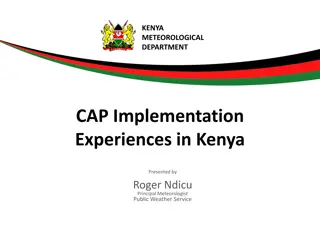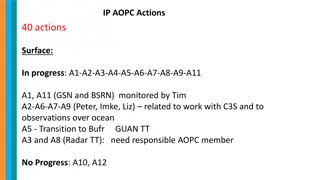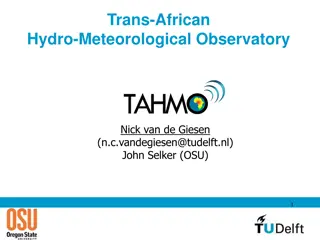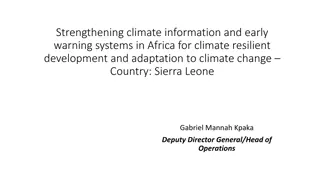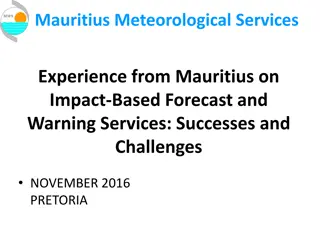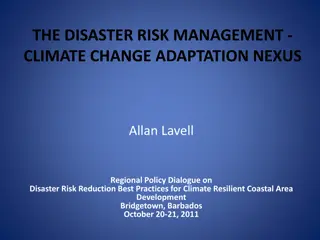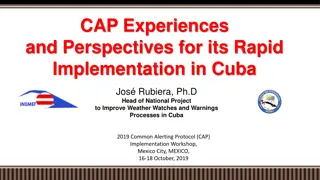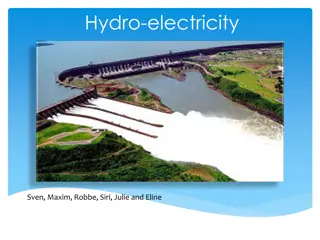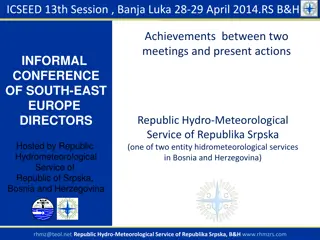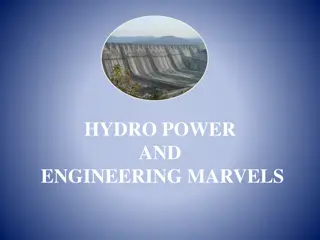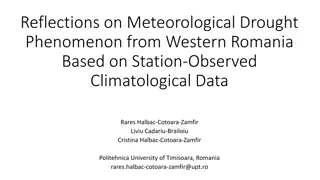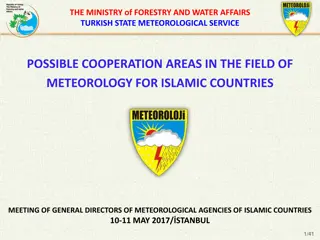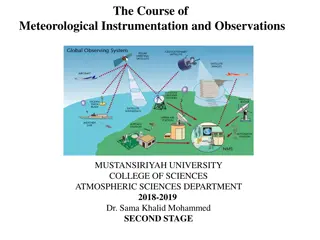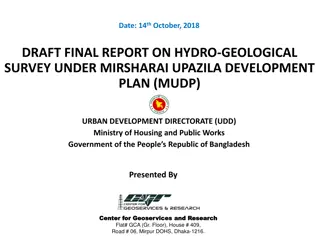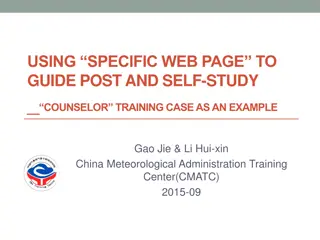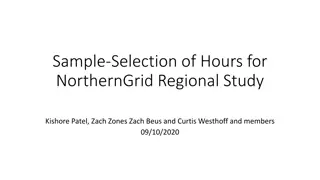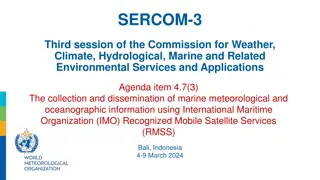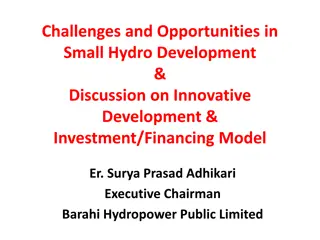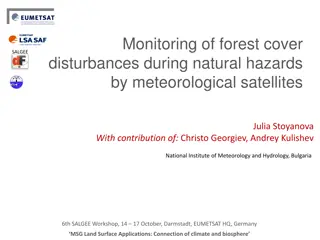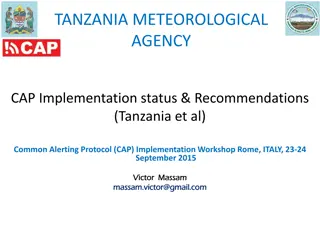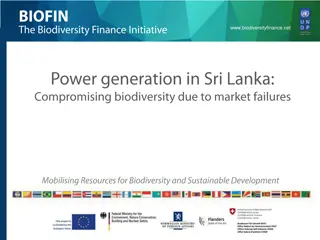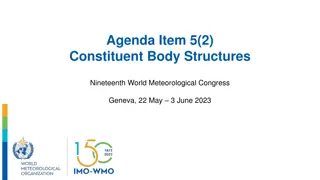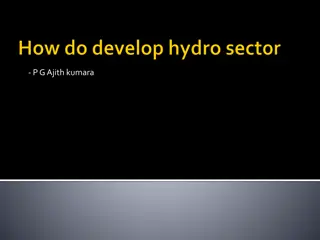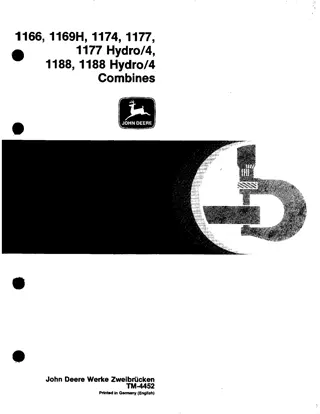Enhancing Early Warning Systems in Lao PDR
Challenges and solutions for improving the early warning system in Lao PDR to address floods, droughts, and extreme weather events. Emphasizes the need for better hydro-meteorological services and infrastructure.
0 views • 8 slides
Understanding Water Needs of Crops Based on Soil, Plant, and Climate Factors
How soil, plant, and meteorological elements impact water requirements of crops. Dive into the effects of temperature, solar radiation, pressure, wind, and humidity on crop production and growth.
2 views • 19 slides
Initial Composition and Requirements of GBON for Effective Meteorological Monitoring
The 19th World Meteorological Congress established the Global Basic Observing Network (GBON) to enhance meteorological monitoring worldwide. The GBON includes specific resolutions, guidelines, requirements, and compliance criteria for surface land stations, upper air stations, aircraft data, and rem
3 views • 24 slides
Upper Thames Hydro Project Updates and Next Steps
The Upper Thames Hydro project aims to install hydropower turbines at 4 weirs on the upper Thames to generate electricity for local use and contribute to the grid. The project has achieved a positive feasibility study, outlined plans, engaged with local stakeholders, and obtained guidance from relev
0 views • 6 slides
2021 Meeting of Directors of Meteorological Services - Actions and Updates
The document discusses the status of actions from the previous meeting of the directors of meteorological services in 2021. It includes updates on convening a committee for reviewing proposed courses, resolving operational matters, and implementing various meteorological services. The content also e
0 views • 4 slides
Climate Change Analysis by Japan Meteorological Agency
Tokyo Climate Center, under Japan Meteorological Agency, uses climate models to assess global warming effects. The observed trends in Tokyo show a significant rise in temperature but no discernible trend in precipitation. Future projections indicate a substantial increase in temperature with uncerta
1 views • 6 slides
State of Power Decarbonization and Resource Planning in Q1 2023
In Q1 2023, there was no recent action on power decarbonization and resource planning by 47 states plus DC & PR. The activity ranged from no action to 10 or more actions in terms of power decarbonization and resource planning. The greatest contributing resources to the state generation mix in 2022 w
0 views • 16 slides
Meteorological Forcing Trends and Hindcasts for Climate Research
The content discusses the available meteorological forcing trends analyzed by Bertrand Bessagnet and Augustin Colette from Institut National de L'Environnement Industriel et des Risques. It explores the rationale behind using ECMWF/IFS for recent campaign analyses and the need to find a consistent 1
0 views • 5 slides
Enhancing Safety Measures for Ships during Volcanic Activity
Analyzing the hazards posed by volcanic activity to maritime shipping, this presentation explores the various risks such as physical damage, loss of stability, and impacts on instruments and engines. It discusses sources of information available, including Volcanic Ash Advisory Centers and Volcanic
0 views • 8 slides
Meteorological Data Analysis and Visualization Tools for Regional Weather Services
Explore advanced tools and technologies for analyzing and visualizing meteorological data in regional weather services. From observational variables to forecast and ensemble models, learn about different plotting methods, interactive features, and map layers used in the field of meteorology. Enhance
0 views • 6 slides
Exploring Weather Phenomena and Meteorological Predictions
Dive into the fascinating world of weather phenomena and the science behind meteorological predictions in this unit of Living By Chemistry SECOND EDITION. Learn about proportional relationships, temperature scales, behavior of gases, and how to interpret weather maps to make accurate predictions. En
0 views • 19 slides
Insights on Observation Error, Ensemble Spread, and Radar Reflectivity in Meteorological Analysis
Explore topics such as temporal and spatial variability in observation error, ensemble spread analysis, baseline observations at DWD, estimation of observation errors, and radar reflectivity analysis. Gain insights into data processing and interpretation in meteorological studies.
0 views • 26 slides
Enhancing Societal Benefits: Key Recommendations from OCP-HL-3, June 2022
NMHSs, research, and the private sector are fostering partnerships to enhance societal benefits. Policies, legislation, and sustained funding are crucial for the sound development of meteorological services. NMHSs must evolve, emphasize socioeconomic needs, and establish win-win partnerships. WMO's
0 views • 6 slides
Renovation, Modernization, and Uprating of Hydro Power Plants
The renovation, modernization, and uprating of hydro power plants involve enhancing efficiency, output, and reliability of aging assets through implementing latest technology. Factors such as service conditions, stress levels, and maintenance standards significantly impact the life expectancy of hyd
0 views • 19 slides
Evolution of Rainfall Monitoring and Meteorological Services in India
The history of rainfall and weather services in India dates back to the early 19th century when the observatory in Madras began recording rainfall in 1793. The India Meteorological Department played a vital role in standardizing rainfall measurements and providing technical guidance to state governm
0 views • 10 slides
Implementation Experiences of CAP by Kenya Meteorological Department
Kenya Meteorological Department (KMD) has been implementing the Common Alerting Protocol (CAP) since late 2012 to enhance the production and dissemination of weather advisories and warnings. KMD is responsible for generating weather alerts, identifying threat events, and classifying messages based o
0 views • 24 slides
Progress and Actions in Meteorological Data Exchange
International efforts are underway to enhance the exchange of meteorological data, including SYNOP and CLIMAT reports, to improve data archives and analysis. Key actions involve monitoring data receipt, upgrading web systems for data visualization, and providing precipitation data to global centers.
0 views • 14 slides
Innovations in Hydro-Meteorological Observatories for Sustainable Environmental Monitoring
This document showcases various design principles and technologies used in the Trans-African Hydro-Meteorological Observatory project, aiming to enhance data collection in meteorology and hydrology for sustainable land monitoring. Key features include robust, low-cost, and self-calibrating systems t
0 views • 33 slides
Strengthening Climate Information and Early Warning Systems in Sierra Leone
Sierra Leone faces increasing climate-related hazards such as droughts, floods, and severe storms, impacting vital sectors like agriculture and infrastructure. This project aims to enhance the country's hydro-meteorological services, improve climate information delivery, and strengthen early warning
0 views • 17 slides
Impact-Based Forecasting and Warning Services in Mauritius: Successes and Challenges
The experience of the Mauritius Meteorological Services in implementing Impact-Based Forecasting and Warning Services is detailed, highlighting successes and challenges encountered in November 2016. The article discusses the main weather hazards faced by Mauritius, such as tropical cyclones, heavy r
0 views • 21 slides
Exploring Pumped Hydro Energy Storage Technologies
Pumped hydro energy storage systems utilize gravitational potential energy of water to store and generate electricity. They are efficient and versatile, with various types such as electro-chemical, thermal, and lithium-ion battery storage. Applications include energy balancing, load leveling, and em
0 views • 10 slides
Disaster Risk Management and Climate Change Nexus in Caribbean Region
The Caribbean region faces critical challenges due to the intersection of disaster risk management and climate change, with annual hydro-meteorological disasters on the rise. Countries like Haiti, Cuba, and Puerto Rico are experiencing increasing disaster impacts, urging immediate attention to clima
0 views • 20 slides
CAP Implementation in Cuba: Experiences and Perspectives for Rapid Progress
José Rubiera, Ph.D., discusses the urgent need for implementing the Common Alerting Protocol (CAP) in Cuba to enhance weather watches and warnings. The challenges faced by the Cuban Meteorological Service are explored, along with plans for CAP implementation in 2020. The overview of Cuba's weather
0 views • 37 slides
Exploring Hydro-Electricity: Sustainable Energy Sources in Norway and Belgium
Discover the world of hydro-electricity with insights on its generation, pros and cons, as well as its significance in Norway and Belgium. Learn about other renewable energy sources like windmills and ways to save energy effectively.
0 views • 26 slides
Informal Conference of South-East Europe Directors on Hydro-Meteorological Services
ICSEED 13th Session in Banja Luka focused on achievements and actions between meetings of Hydro-Meteorological Services in Bosnia and Herzegovina. The conference highlighted the Memorandum of Understanding between different institutions for cooperation in meteorology and hydrology. Through cross-bor
0 views • 23 slides
Hydro Power Development and Engineering Marvels in India
Explore the fascinating world of hydro power engineering marvels in India, featuring iconic dams like Tehri Dam, Bhakra Dam, Nagarjuna Sagar Dam, and Sardar Sarovar Dam. Learn about the significant contributions of hydro power projects to India's development and agriculture sector, showcasing the gr
0 views • 15 slides
Analysis of Meteorological Drought in Western Romania: A Case Study of Timisoara Area
Climate changes in Eastern Europe have led to an increase in extreme weather events like droughts in Western Romania. This article focuses on the Standardized Precipitation Index analysis of meteorological drought over the last 50 years in Timisoara. Results indicate a rise in severely dry months du
0 views • 20 slides
Collaboration Opportunities in Meteorology for Islamic Countries
The Ministry of Forestry and Water Affairs in Turkey, along with the Turkish State Meteorological Service, organized a meeting for General Directors of Meteorological Agencies from Islamic countries in May 2017 in Istanbul. The areas of possible cooperation included observations and observing system
0 views • 9 slides
Meteorological Instrumentation and Observations Overview
Overview of weather maps, symbols, and the weather station model used in meteorological instrumentation and observations. Explains the importance of weather charts in forecasting processes. Also introduces the FM System of Code Forms for reporting weather observations. Helpful resources for students
0 views • 42 slides
Hydro-Geological Survey Report in Mirsharai Upazila
This draft final report presents the findings of a hydro-geological survey conducted under the Mirsharai Upazila Development Plan by the Urban Development Directorate in Bangladesh. The report includes digital elevation models, aquifer architecture, isopach maps, cross-sections, aquifer frameworks,
0 views • 27 slides
Creating an Online Platform for Counselor Training at China Meteorological Administration Training Center
Explore the development of a specific web page to guide counselor training using the China Meteorological Administration Training Center as a case study. The focus is on addressing the needs of counselors through online resources, communication platforms, and pre-training support. Learn about the ba
0 views • 11 slides
Analysis of Load, Generation, and Hydro Data for NorthernGrid Regional Study
This data presents information on load, generation, and hydro aspects in the NorthernGrid regional study. It includes data for different dates and hours, showcasing trends in energy consumption, production, and hydroelectric power across various regions.
0 views • 6 slides
Modernization of Maritime Services for Enhanced Safety and Data Collection
The collection and dissemination of marine meteorological and oceanographic information using multiple Recognized Mobile Satellite Services (RMSS) is essential for improving global coverage and data sharing. The modernization of services, including Iridium SafetyCast and INMARSAT, enhances the Globa
0 views • 6 slides
Challenges and Opportunities in Small Hydro Development: Discussion on Innovative Investment Models
This discussion covers the challenges and opportunities in small hydro development, including license and investment status, impact of COVID-19, recommendations for relief, and future development and financial models. It highlights the status of licenses for projects up to 5MW, investment informatio
0 views • 15 slides
Monitoring Forest Cover Disturbances During Natural Hazards by Meteorological Satellites
Ecosystem functioning relies on energy, water, and carbon fluxes regulated by vegetation and soil properties. This study focuses on monitoring forest cover disturbances before, during, and after natural hazards using meteorological satellites. It involves analyzing land surface temperature, evapotra
0 views • 37 slides
Implementation Status and Recommendations for CAP in Tanzania Meteorological Agency
Tanzania Meteorological Agency has successfully implemented the Common Alerting Protocol (CAP) under the Meteorology category, enabling timely dissemination of information to the public through various media channels. Recommendations include protocol adoption, system availability, promotion through
0 views • 20 slides
Challenges and Opportunities in Sri Lanka's Energy Sector
Sri Lanka's energy landscape faces various challenges including reliance on coal, exhausted hydro power capacity, and low efficiency in power generation. Major issues involve considering coal without accounting for externalities, low hydro plant factors, and government vs. private ownership. Improvi
0 views • 16 slides
Evolution of Constituent Bodies in World Meteorological Congress
The evolution of constituent bodies in the World Meteorological Congress from 1951 to 2019 highlights key structural changes, reviews, repeated proposals, and the 2019 governance reform as a significant event. The continuous process of improvement aims to enhance coordination, management, planning,
0 views • 13 slides
Sustainable Community-Based Hydro Power Projects Development Framework
This framework outlines steps for developing sustainable community-based hydro power projects. It covers aspects like capacity building, partner identification, monitoring, grid connection, registration, quality control, and certification at state/district levels. It emphasizes building confidence a
0 views • 14 slides
John Deere 1166, 1169H, 1174, 1177, 1177 Hydro 4, 1188, 1188 Hydro 4 Combines Service Repair Manual Instant Download
Please open the website below to get the complete manual\n\n\/\/
0 views • 19 slides

